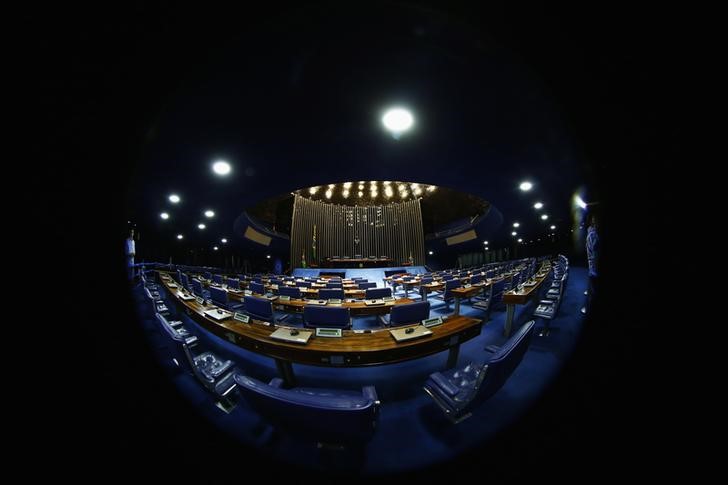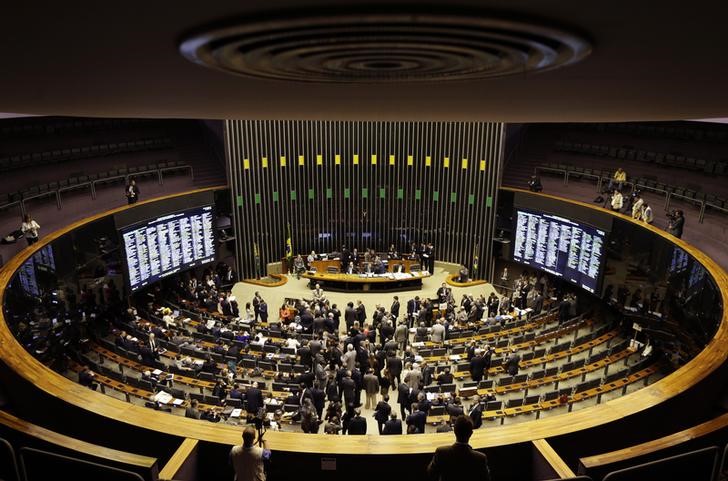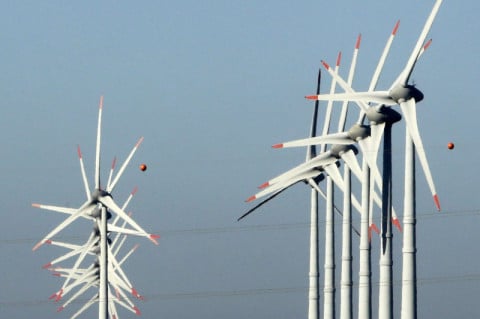 A protester holds a sign related to the release of the Jeffrey Epstein case files outside the Capitol in Washington, D.C., on Nov. 12, 2025. Photo: Saul Loeb/AFP via Getty Images
A protester holds a sign related to the release of the Jeffrey Epstein case files outside the Capitol in Washington, D.C., on Nov. 12, 2025. Photo: Saul Loeb/AFP via Getty Images ![]()
Alain Stephens is an investigative reporter covering gun violence, arms trafficking, and federal law enforcement.
It’s hard to imagine a worse moment for Donald Trump to be caught in the Epstein dragnet than at the tail end of the longest government shutdown in U.S. history, with food benefits rattled, “affordability” on everyone’s minds, and his own voters starting to wonder if the guy in the red tie is actually on their side.
On the same day Trump finally signed a bill to reopen the government after 43 days of chaos, a coalition of House Democrats and Republicans dropped a tranche of Jeffrey Epstein emails that punches holes straight through the president’s carefully curated story about a distant, long-ago acquaintance, with Epstein alleging Trump “knew about the girls” and “spent hours at my house” with one of the victims.
While the messages don’t show criminal conduct by Trump, they landed at a moment when Americans are already furious with his handling of Epstein’s files, the shutdown, and the basic question of whether their government works for the powerful or for everyone else. Together, they form a pincer around a president who keeps promising transparency and law and order, then flinching the second those promises threaten him personally.
“The Dog That Hasn’t Barked”
The new emails came from the Epstein Estate in response to a subpoena and were released by the House Oversight Committee.
In one April 2011 exchange, Epstein tells Ghislaine Maxwell, his associate who is currently serving a 20-year sentence for sex trafficking, that “the dog that hasn’t barked is trump,” adding that a trafficking victim “spent hours at my house with him” yet “he has never once been mentioned.” Maxwell replies that she has “been thinking about that.”
In another email, from January 2019, Epstein writes to author Michael Wolff about Mar-a-Lago: “Trump said he asked me to resign, never a member ever. Of course he knew about the girls as he asked ghislaine to stop.”
A third exchange from December 2015 shows Wolff and Epstein gaming out how Trump should respond to questions from CNN about their relationship, with Wolff advising Epstein to “let him hang himself” if Trump “says he hasn’t been on the plane or to the house” because that would give Epstein “PR and political currency” over him.
The emails cut against Trump’s own narrative that he barely knew Epstein.
The more than 23,000 documents do not contain the storied “client list” the internet — and Trump’s own supporters — have been clamoring for, and none of the publicly released civil case records accuse Trump. But the emails do something almost as politically toxic: They cut against Trump’s own narrative that he barely knew Epstein, and that he had no meaningful insight into what Epstein had done.
The White House is already calling the messages a “fake narrative” stitched together by partisan Democrats and pointing out that key accuser Virginia Giuffre, who died by suicide earlier this year, repeatedly said she never saw Trump engage in wrongdoing. (Trump himself has also repeatedly denied any wrongdoing related to Epstein’s crimes.) Republicans on the Oversight Committee accused Democrats of selectively redacting her name to make the emails look worse. But the specific denials aren’t the point anymore; the point is that the president now looks like he has something to hide about his role in a story where many Americans are already inclined to believe there was a cover-up.
America Wants the Files
Public opinion on this issue is not subtle. Polling in early October found that about three-quarters of Americans want all Epstein-related files released, with only 9 percent saying no documents should be made public.
A Reuters/Ipsos survey in July went even further: 69 percent of respondents said they believe Trump’s administration is hiding details about Epstein’s clients; just 6 percent said it isn’t. Only 17 percent approved of Trump’s handling of the case, his worst score on any issue in that poll. Even among Republicans the president was underwater.
This isn’t a niche, left-wing obsession. A July Economist/YouGov poll found that views on the need for transparency in the Epstein investigation cut across partisan lines, even as Trump’s overall job approval slid to a net negative of 15 points. PBS’s own write-up notes that support for releasing the files includes majorities of Republicans and independents.
The long algebra cut short, Americans might be OK with all manner of Trump impropriety, but you lose them when a disgraced billionaire pedophile enters the fray.
For years, Republicans have built their identity around a moral panic of their own design — branding political opponents as “groomers,” painting LGBTQ+ people as threats to children, and accusing anyone outside their tribe of abetting pedophilia. They’ve cast themselves as the last line of defense against child trafficking, stoking a base that’s become genuinely animated by fantasies of a global cabal preying on kids. That’s why the Epstein revelations land like an airburst: not because the conspiracy is real in the way they imagine it, but because it punctures the mythology they’ve wrapped themselves in, exposing the rot inside the movement that claims to be protecting America’s children.
The Epstein emails hit, and suddenly the MAGA universe isn’t marching in lockstep; Rep. Marjorie Taylor Greene went online and tore into Trump for “how hard he’s fighting to stop the Epstein files from coming out,” a line you only write when something in the foundation has shifted. She followed it by saying her loyalty is to God and her voters first — a subtle mutiny, but a mutiny all the same.
That’s the backdrop for the House push to force the issue. Reps. Ro Khanna, D-Calif., and Thomas Massie, R-Ky., and dozens of bipartisan co-sponsors have been pushing legislation that would compel the Justice Department to publish its Epstein records, building on earlier efforts from Florida Democrats who chased these documents during the Biden years. On Wednesday night, the House forced Speaker Mike Johnson’s hand with an arcane rules maneuver that finally made him schedule a vote on releasing the records for next week, over objections from House Republicans and the White House. That measure is likely to pass the House but would face a much tougher road through the Senate. However, should it pass the Senate, it would force a showdown in which Trump could either sign that bill and live with whatever comes out — or veto it and tell an already suspicious public that he personally stopped the truth from seeing daylight.
A Credibility Crisis
If that were the only fire burning, the White House might be able to ride it out. It isn’t.
The email release landed in the final days of a 43-day shutdown that shuttered much of the federal government and froze Supplemental Nutrition Assistance Program payments for roughly 42 million people — the first time in modern history SNAP funding was allowed to lapse during a shutdown. Federal judges twice ordered the administration to restore full benefits; the Supreme Court granted Trump’s emergency appeal and temporarily blocked one of those orders, leaving families in limbo while states scrambled to cover the gap.
Policy analysts and state attorneys general pointed out that the Department of Agriculture has billions in contingency reserves and other emergency accounts precisely for situations like this, and that the administration could have used them to keep food assistance flowing. Instead, the White House chose a monthslong game of chicken over health care tax credits while airports backed up, disability beneficiaries rationed groceries, and parents fielded notices that their EBT cards would go dry. And while the GOP shutdown gambit paid off for the Republicans in the short term, many Americans blamed them as the source of their pain.
America’s affordability crises has arrived, and Trump is on the hook. A new AP/NORC poll released this week found only 36 percent of adults approve of Trump’s overall performance and just about a third approve of his handling of the economy, health care, or the federal government. Most dangerous for Trump, the erosion of his establishment is finally showing up, and the call is coming from inside the house. That same poll found his declining approval rating was mostly driven by Republicans, with their approval for his management of the federal government falling from 81 percent in March to 68 percent now.
Ask voters what actually matters to them, and they point first to the economy and affordability: Three-quarters say the economy is “very important” to their 2026 vote; majorities say the same about threats to democracy, immigration, and housing costs. Trump is underwater on almost all of it.
So when new emails emerge suggesting that he has not told the whole story about his relationship with a convicted child sex trafficker — just as his choices have people lining up at food banks — that story doesn’t land in a vacuum. It lands in a country that already suspects the president is looking out for himself first.
A Pincer of His Own Making
The looming House vote on Epstein transparency turns that suspicion into a structural problem. On one flank, Trump faces a broad electorate that overwhelmingly wants every unclassified Epstein record released and already believes his administration is hiding the worst of it. On the other, he faces a Congress that, for once, is being nudged toward genuine oversight by a coalition that runs from progressive Democrats to libertarian Republicans.
If the bill passes the Senate and Trump signs it, he loses control of the documents — and the narrative — entirely. The Justice Department has already admitted it is sitting on tens of thousands of pages of records beyond what civil suits and Maxwell’s trial exposed, and has so far produced only a fraction of what congressional subpoenas demand. Nobody in the White House can guarantee that there isn’t another “dog that hasn’t barked” email buried somewhere in that pile.
Veto the bill, and the president becomes the single most visible obstacle to telling Epstein’s victims — and the public — the full story. He would be doing it after a shutdown that left poor and disabled Americans wondering how they were going to eat and after months of promising that his second term would finally bring accountability for elites who prey on children.
Either way, the myth Trump sold to his base — that he was the one man willing to expose the secrets of the powerful — is collapsing in real time. In poll after poll, people say they think he is protecting somebody. Increasingly, they have to ask whether that somebody is himself.
The Wrong Time to Blink
You can feel Republicans straining to square the circle. On Capitol Hill, they accuse Democrats of weaponizing the emails while insisting they, too, support “full transparency” — eventually, after careful redactions and more closed-door review. In conservative media, some MAGA dynamos have raged that the Epstein focus is a liberal “distraction” from real issues like inflation, even as their own viewers tell pollsters that grocery prices and rent are exactly why they’re so angry at the shutdown and at Trump’s economy.
With full awareness of that dissonance, the administration is now sprinting toward an economic message it hopes can drown out the rest. Trump has reportedly ramped up his travel schedule, darting through swing states in a rushed attempt to smother the Epstein fallout under the safer storyline of economic revival. The White House may frame it as a shoring up of constituency, but it looks more like damage control: factory visits, small-business roundtables, and grocery store photo ops meant to convince voters the economy is better than it feels.
But no amount of travel gloss can obscure the deeper habit Americans are starting to recognize. A president who promised to smash corrupt systems has instead opted its to starve his poorest citizens during a manufactured crisis and slow-walk the truth about one of the most notorious predators of our time. It’s the same reflex: Use state power to protect the powerful, then gaslight the public about who is really to blame.
The House and Senate may be about to force him to choose. Release the files and gamble that whatever is in there won’t destroy him, or veto transparency and finally make clear that the swamp he promised to drain was never meant to include the likes of Jeffrey Epstein — or that he’s a creature of the swamp himself.

 German (DE)
German (DE)  English (US)
English (US)  Spanish (ES)
Spanish (ES)  French (FR)
French (FR)  Hindi (IN)
Hindi (IN)  Italian (IT)
Italian (IT)  Portuguese (BR)
Portuguese (BR)  Russian (RU)
Russian (RU) 





:strip_icc()/i.s3.glbimg.com/v1/AUTH_59edd422c0c84a879bd37670ae4f538a/internal_photos/bs/2023/l/g/UvNZinRh2puy1SCdeg8w/cb1b14f2-970b-4f5c-a175-75a6c34ef729.jpg)










Comentários
Aproveite ao máximo as notícias fazendo login
Entrar Registro